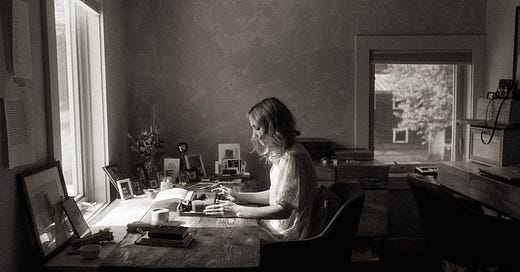The Fear That Shows Up When You’re About to Write the Truth
Why the thing that scares you to write might be the thing that sets you free
I was afraid to write the memoir chapter I published last week.
I’m not talking about the kind of fear that whispers maybe this isn’t very good. I’m talking about the full-body, heart-racing, sweat-slicked panic that makes you want to close the laptop and walk away forever.
It’s the kind of fear that says:
You’re not ready for this.
You’re not allowed to say this.
You’re going to ruin everything.
That chapter held a particular kind of heat. My baby brother with burns on his face. The bottle of milk gone sour. Our mother, disappearing again and again—in a white fur coat, in the haze of cigarette smoke, in the flash of a DEA raid. Me, trying to comfort him with sticky fingers and a piece of red silk Mom had handed down like a makeshift security blanket.
It was hard to go back there.
It wasn’t just memory—it was grief. Guilt. A kind of fragile love I didn’t know how to hold at the time. Honestly, I’m still learning.
And yes, some of the fear was craft-related. What if I can’t do this scene justice?
But mostly it was emotional. Physiological. Full-body fear.
What if writing this breaks something open in me that I can’t put back?
What if it unravels my brother, who’s blocked out so much for so long?
What if Dad reads it and hates himself all over again? (Did he ever stop?)
I almost didn’t write it.
But I’ve learned something over the years—something I come back to again and again, especially when the story starts to shake me.
Fear isn’t a block. It’s a signal.
Fear is how the body says, this matters.
Fear is how the nervous system says, proceed with care.
Fear is not a stop sign—it’s a threshold.
We’re told to “push through” fear. But I’ve found a softer way.
One that asks, Can I make space for this fear? Can I listen to what it’s trying to tell me?
Because fear rarely shows up when you’re skimming the surface.
It arrives when you’re digging.
When you’re writing into truth.
When you’re getting close to the thing that wants to be named.
Writing that chapter didn’t make the fear disappear. But it showed me I could hold it and still move forward. It reminded me that the stories that scare me the most are often the ones that connect the deepest. They’re the ones that crack something open—for me, and maybe for someone else, too.
So if fear is showing up for you around a story, I want to offer this…
What if the fear isn’t a reason to stop?
What if it’s proof you’re on to something real?
You don’t have to write it all today. But maybe you can sit with it. Listen to it. Breathe with it.
Ask yourself, What is this fear trying to protect? What is it trying to show me?
And then, when you’re ready, maybe you write the next true sentence.
I’m so glad I wrote mine.
What’s one true sentence from something you’ve written or are working on?
No context needed (unless it feels good to share). Just one honest line—the kind that stayed with you after you wrote it. I’d love to read it.
Next week I’m sharing the exact process I use when fear shows up. It’s gentle, body-based, and it’s helped me write some of my most vulnerable work. Stay close. I can’t wait to share it with you.
If you haven’t read it yet, this is the chapter I wrote through tears—the one about my baby brother, about loss, survival, and the kind of grief that leaves a mark.
Chapter 5: The Color of Abandon
*Audio player is located at the end of the chapter. Scroll down to play.
Also, this piece on why writing the truth feels so damn hard—and why that’s not your fault.







“What if the fear isn’t a reason to stop? What if it’s proof you’re on to something real?” So good, Jessy. I have several pieces nearly ready that fall precisely into this category. The way you detailed this… spot on. Thanks for sharing!
You articulate this so well, the terror of revisiting those moments and the fear of loss of connection. It's so cathartic to unravel it all. 💜